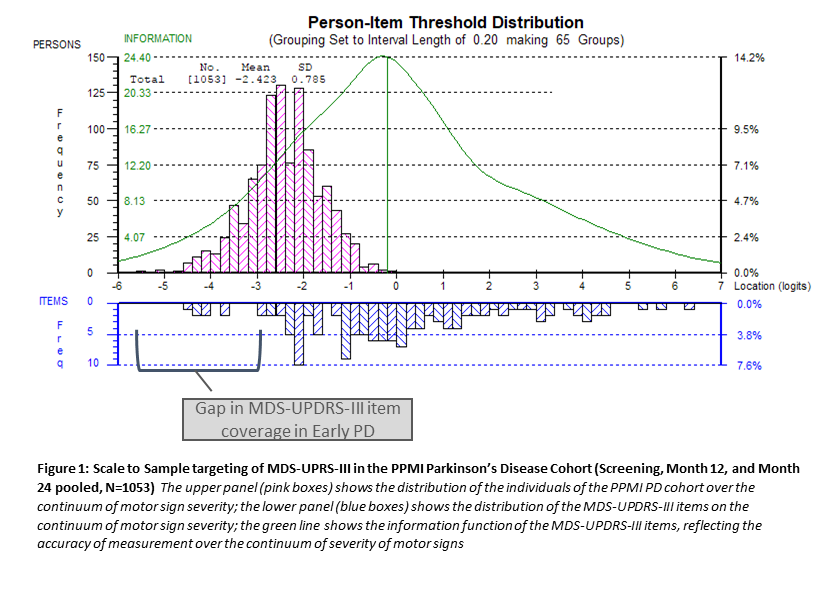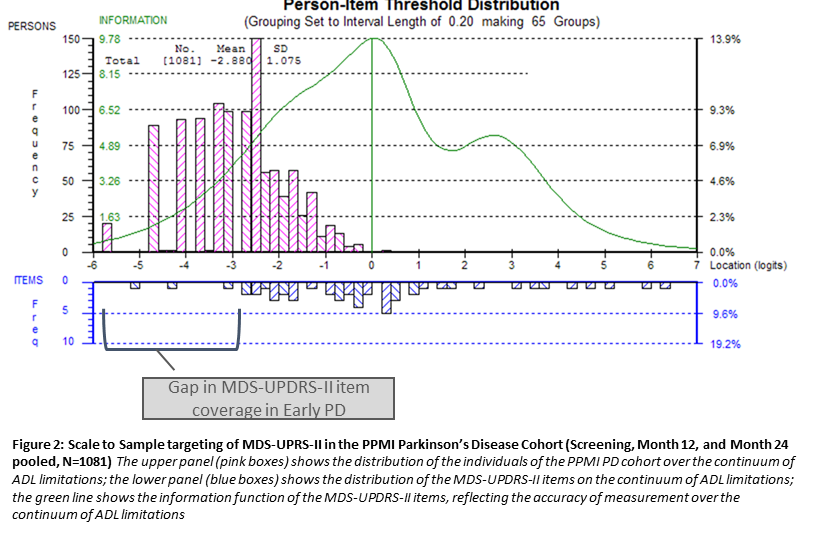Session Information
Date: Monday, October 8, 2018
Session Title: Rating Scales
Session Time: 1:15pm-2:45pm
Location: Hall 3FG
Objective: Our objective was to explore the psychometric evidence for the use of the Movement Disorder Society Unified Parkinson’s Disease Rating Scale (MDS-UPDRS) part II (activities of daily living [ADL]; 13 items) and part III (motor; 33 items) in the context of early stage Parkinson’s Disease (PD).
Background: The development of disease modifying therapies for PD calls for an outcomes measurement strategy focusing on the characterization of early stage disease progression.
Methods: MDS-UPDRS-II and -III data was collected at three timepoints (screening, month 12, month 24) from 384 PD patients (diagnoses 2 years or less; Hoehn & Yahr stage I/II) in the Parkinson’s Progression Markers Initiative (PPMI) study. Psychometric analysis, based on Rasch measurement theory (RMT), was carried out on both the original MDS UPDRS-II & -III scales and alternate exploratory content-driven scale structures.
Results: RMT analyses showed original MDS-UPDRS-II & -III scales had adequate reliability (0.71 & 0.82, respectively). However, neither scale was well targeted to early PD even with alternative structure specifications. There was a marked floor effect for most items and a clear item gap was consistently observed in the coverage of very mild severity of motor signs (Figure 1) and levels of ADL impact (Figure 2). Other psychometric problems for the original MDS-UPDRS-II & -III scales included disordered thresholds (9/13 & 20/33 items, respectively), indicating response scales not functioning as expected, and misfit (5/13 & 12/33 items, respectively), flagging potentially problematic items.
Conclusions: The MDS-UDPRS-II and -III have important psychometric limitations, which negatively impact on their potential to quantify ADL and motor symptoms in early PD. In particular, the significant mis-targeting will lead to insensitivity in detecting differences and clinical change. However, the UPDRS-III item hierarchy revealed by the RMT analysis offers important building blocks to build on the characterization of the course of early PD. Additional better-targeted items (e.g. ipsilateral lower-extremity bradykinesia or carefully selected ADLs) may help to improve this situation.
To cite this abstract in AMA style:
A. Regnault, B. Boroodjerdi, J. Meunier, M. Bani, S. Cano. A Psychometric Analysis of the MDS UPDRS-II and III in Early Parkinson’s disease: Do the Numbers Add Up? [abstract]. Mov Disord. 2018; 33 (suppl 2). https://www.mdsabstracts.org/abstract/a-psychometric-analysis-of-the-mds-updrs-ii-and-iii-in-early-parkinsons-disease-do-the-numbers-add-up/. Accessed February 16, 2026.« Back to 2018 International Congress
MDS Abstracts - https://www.mdsabstracts.org/abstract/a-psychometric-analysis-of-the-mds-updrs-ii-and-iii-in-early-parkinsons-disease-do-the-numbers-add-up/


